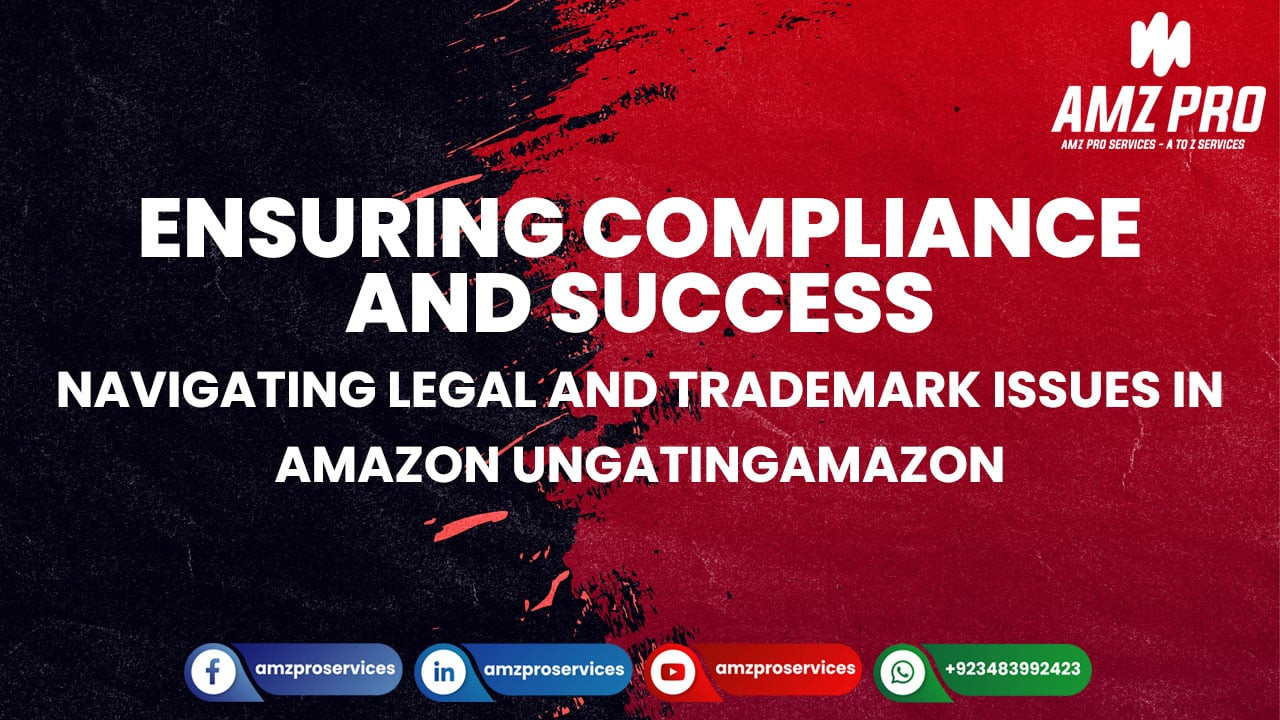The role of legal and trademark issues in ungating products on amazon
Selling products on Amazon can be an excellent way to make a profit, but there are certain categories or products that require a seller to go through the ungating process. During the ungating process, one crucial factor that a seller needs to consider is legal and trademark issues. In this blog post, we will discuss the importance of legal and trademark issues in ungating products on Amazon, what sellers need to do to comply with Amazon's policies and guidelines, and what they can do to increase their chances of getting ungated.
Understanding Legal and Trademark Issues:
Legal and trademark issues are common concerns for sellers when selling on Amazon. As a seller, it is essential to be aware of these issues and how they can impact your ability to sell certain products on Amazon.
Trademark infringement is one of the most common legal issues that sellers may encounter when selling on Amazon. It occurs when a seller uses another company's trademarked name or logo without permission. This can lead to legal action against the seller, and Amazon may prevent them from selling certain products.
Patent infringement is another legal issue that sellers may face when selling on Amazon. It occurs when a seller uses another company's patented technology without permission. This can lead to legal action against the seller, and Amazon may prevent them from selling certain products.
Legal and trademark issues can also arise when selling products that are regulated by federal or state laws. For example, products that contain certain chemicals or are intended for use in medical procedures may require specific documentation or certification to sell on Amazon.
The Role of Legal and Trademark Issues in the Ungating Process:
When ungating products on Amazon, sellers need to ensure that their products comply with all legal and trademark issues. Amazon has strict guidelines and policies in place to protect trademark and patent rights and prevent the sale of counterfeit products.
To get approved for ungating, sellers must provide all necessary documentation and certifications to demonstrate that their products comply with Amazon's policies and guidelines. This includes providing proof of ownership of any trademarks or patents used in the product and showing that the product doesn't infringe on any existing trademarks or patents.
Sellers must also ensure that their products comply with all federal and state laws and regulations. This may involve obtaining specific certifications or licenses to sell the product on Amazon.
If a seller's application for ungating is denied due to legal or trademark issues, Amazon may provide feedback on the specific issues that need to be addressed. Sellers must take the necessary steps to address these issues and resubmit their application for ungating.
The Importance of Addressing Legal and Trademark Issues:
Addressing legal and trademark issues is crucial for sellers looking to sell products on Amazon. Failure to comply with Amazon's policies and guidelines can result in account suspension or legal action.
Sellers must take proactive steps to ensure that their products comply with all legal and trademark issues. This may involve conducting thorough research to ensure that the product doesn't infringe on any existing trademarks or patents and obtaining any necessary certifications or licenses required by federal or state laws.
Ways to Address Legal and Trademark Issues:
There are several ways that sellers can address legal and trademark issues to ensure that their products comply with Amazon's policies and guidelines.
- Conduct thorough research: Sellers should conduct thorough research to ensure that their products do not infringe on any existing trademarks or patents. This can involve using trademark and patent databases to search for similar products or trademarks and comparing them to the seller's product to ensure there are no similarities.
- Obtain legal advice: If a seller is unsure about whether their product infringes on any legal or trademark issues, they should consider seeking legal advice. An attorney can help sellers determine if their product complies with Amazon's policies and guidelines and help them navigate any legal issues that may arise.
- Obtain certifications or licenses: If a product is regulated by federal or state laws, sellers should obtain any necessary certifications or licenses required to sell the product on Amazon. This can involve obtaining FDA approval for medical devices or obtaining a hazardous materials certification for products that contain certain chemicals.
- Avoid using trademarked names or logos: Sellers should avoid using trademarked names or logos in their product descriptions or titles unless they have permission from the trademark owner. Using trademarked names or logos without permission can result in legal action against the seller and prevent them from selling certain products on Amazon.
Increasing Chances of Getting Ungated:
To increase their chances of getting ungated, sellers should take proactive steps to ensure that their products comply with all legal and trademark issues.
- Provide all necessary documentation: Sellers should ensure that they provide all necessary documentation and certifications to demonstrate compliance with Amazon's policies and guidelines. This includes providing proof of ownership of any trademarks or patents used in the product and demonstrating that the product does not infringe on any existing trademarks or patents.
- Follow Amazon's policies and guidelines: Sellers should ensure that their products comply with Amazon's policies and guidelines, including avoiding using trademarked names or logos without permission and complying with all federal and state laws and regulations.
- Address any feedback from Amazon: If a seller's application for ungating is denied due to legal or trademark issues, Amazon may provide feedback on the specific issues that need to be addressed. Sellers should take the necessary steps to address these issues and resubmit their application for ungating.
Conclusion:
In conclusion, legal and trademark issues are critical factors that sellers must consider when ungating products on Amazon. Failure to comply with Amazon's policies and guidelines can result in account suspension or legal action. Sellers should take proactive steps to ensure that their products comply with all legal and trademark issues, including conducting thorough research, obtaining legal advice, obtaining certifications or licenses, and avoiding using trademarked names or logos without permission. By addressing these issues proactively, sellers can increase their chances of getting ungated and selling their products on Amazon.

